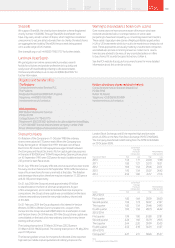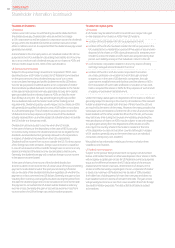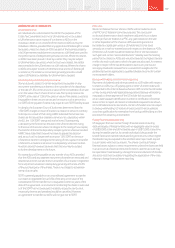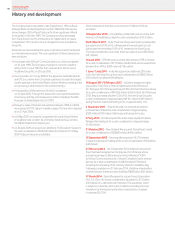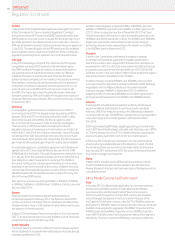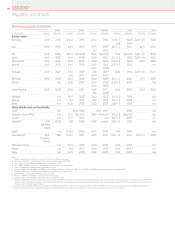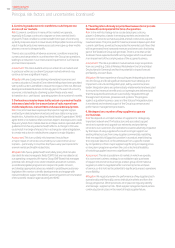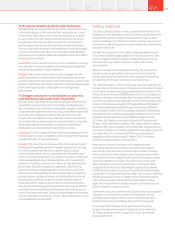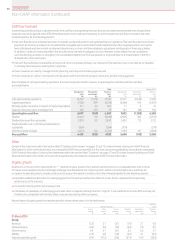Vodafone 2014 Annual Report Download - page 194
Download and view the complete annual report
Please find page 194 of the 2014 Vodafone annual report below. You can navigate through the pages in the report by either clicking on the pages listed below, or by using the keyword search tool below to find specific information within the annual report.
Ireland
In December 2012, Vodafone Ireland judicially challenged the decision
of the Commission for Communications Regulation (‘ComReg’),
to impose an interim MTR based on a BEREC benchmark rather than
a MTR based on a full cost model. In August 2013, the Irish High Court
found the decision to be unlawful and by Court order, set a maximum
MTR rate for the Irish market of 2.60 eurocents per minute, to apply from
1 July 2013. This rate will apply until a MTR based on a fully modelled
price is available which is expected in September 2014. ComReg has
appealed the Irish High Court’s decision, to the Irish Supreme Court.
Portugal
In July 2013, following a complaint from Optimus, the Portuguese
Competition Authority (‘PCA’) opened an administrative inquiry
into TMN, Vodafone Portugal and Optimus to assess the existence
of a potential abuse of individual dominant position by TMN and
Vodafone Portugal or a potential abuse of collective dominant
position by these companies on the mobile communications services
retail markets, consisting of a rate discrimination (i.e. the application
of dissimilar conditions to equivalent services) between the on-net
prices of voice calls and SMS and the off-net prices of voice calls
and SMS. The inquiry also covers the potential abuse of individual
dominant position by TMN and Vodafone Portugal in their respective
wholesale SMS termination markets. We submitted preliminary remarks
in September 2013.
Romania
An investigation by the Romanian Competition Council (‘RCA’)
commenced in April 2011 for alleged margin squeeze by all MNOs
between 2006 and 2011 on wholesale termination tariffs. In May
2012, at the request of the MNOs, the RCA accepted to enter
into a commitment procedure in order to close the investigation.
Their concerns on MTRs have been resolved by the national
regulator’s decision on a new long-run incremental cost model that
means from 1 April 2014, the maximum termination rates in Romania
will decrease from 0.67 eurocents per minute to 0.14 eurocents per
minute for xed call termination and, respectively, from 3.07 eurocents
per minute to 0.96 eurocents per minute for mobile call termination.
A cross-border spectrum coordination agreement with Ukraine was
signed in June 2013, ensuring interference free use of the E-GSM
900MHz band at the border. Although the agreement entered into force
on 1 January 2014, the Ukrainian operators are not currently fullling
their obligations under the agreement, resulting in the Vodafone
Romania E-GSM spectrum facing heavy interference in some areas,
especially on the south-east side of the country. Vodafone Romania,
with the help of the national regulator, is working to nd a timely and
efcient solution with the Ukrainian operators, before the entry into
force of the new GSM licences.
New spectrum licenses comprising 2x10MHz in 800MHz, 2x10MHz
in 900MHz, 2x30MHz in 1800MHz and 1x15MHz in 2.6GHz, came into
force on 5 April 2014.
Greece
Offers for tender for the National Rural Broadband Network
construction opened in February 2014. The xed incumbent (OTE)
and the consortium of Intrakat, Intracom Holdings and Hellas Online
(Vodafone Greece has an 18.5% interest in Hellas Online) are the only
two parties in the tender process.
In March 2014, the Hellenic Telecommunications & Post Commission
(‘EETT’) announced that spectrum in the 800MHz and 2.6 GHz bands
is expected to be auctioned after July 2014.
Czech Republic
The Czech Telecommunications Ofce (‘CTU’), the national regulator,
has not resolved the issues with their draft analysis on access and call
origination published in 2012.
Vodafone Czech Republic acquired 2x10MHz of 800MHz spectrum,
2x4MHz of 1800MHz spectrum and 2x20MHz of 2.6GHz spectrum for
CZK 3.1 billion in a spectrum auction in November 2013. The Czech
Telecommunication Ofce plans to sell the remaining spectrum in the
1800MHz and 2.6GHz bands later in 2014. The 800MHz and 1800MHz
frequencies reserved for a new entrant remain unsold. Using our
technology neutral licence, we launched a 4G network on 2x3MHz
in the 900MHz band, in November 2013.
Hungary
Further to the Commission withdrawing its initiative to prepare
an infringement procedure against the Hungarian government’s
telecommunications tax, in August 2013 the telecommunications tax
was raised from HUF 2 to HUF 3 per voice minute and SMS and the cap
on business subscriptions has been doubled from HUF 2,500 to HUF
5,000 per month. In the year ended 31 March 2014, Vodafone Hungary’s
telecommunications tax liability is HUF 10 billion.
Vodafone Hungary’s original 900MHz and 1800MHz licences which
were due to expire in July 2014, have been extended to 2022 following
negotiations with the National Media and Infocommunications
Authority Hungary (‘NMIAH’) in September 2013. The NMIAH is
preparing to offer the 4G bands (800MHz and 2.6GHz) together with
some remaining frequencies in the 900MHz and 1800MHz bands.
Albania
In January 2014, the Albanian Competition Authority (‘ACA’) issued
recommendations to the Electronic and Postal Communications
Authority (‘AKEP’) for measures to reduce the differentiation between
on-net and off-net calls. The AKEP has imposed new account separation
rules, which apply to the mobile operators and xed incumbent
from 2014.
AKEP is also reviewing MTR rates, targeting pure long run incremental
cost (‘LRIC’) benchmarking levels with glide-path reducing current MTRs
to 1.0 eurocents per minute in 2015. Vodafone Albania is opposing the
proposal to apply asymmetric rates for the two smaller players.
In February 2014, following an investigation into the potential abuse
of dominance by Vodafone Albania in the telephony market, the ACA
found that Vodafone was dominant in the retail market for the period
from January 2011 to December 2012. No abuse of this status has been
found and no charges were imposed.
Malta
In March 2014, the MCA set the MTR at 0.40 eurocents per minute
to which Vodafone has submitted an appeal to the Administrative
Review Tribunal on the basis that there was a lack of transparency in the
consultation process.
Africa, Middle East and Asia Pacic region
India
In January 2013, Vodafone India’s application for a ten year extension
to their existing 900MHz licences in Delhi, Mumbai and Kolkata
was unsuccessful and the Department of Telecommunications
(‘DoT’) included that spectrum in their 2013 auction plan. Vodafone
India challenged this decision in the courts and in February 2014,
the Supreme Court found in favour of the DoT. The 900MHz spectrum
along with the 1800MHz spectrum was auctioned in February 2014 and
Vodafone India acquired an aggregate of 2x23MHz of spectrum in the
900MHz band and 2x49MHz of spectrum in the 1800MHz band at a
cost of INR 19.6 billion, which will be paid as an initial up-front payment
followed by 10 annual instalments (following a two year moratorium).
Vodafone Group Plc
Annual Report 2014192
Regulation (continued)



